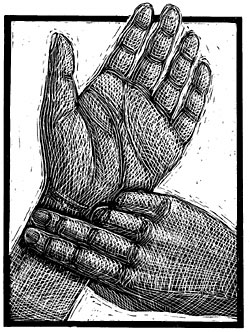Student Notebook
Pro salute publica
By Bryn Doty, R.N.
'Why are you studying that? What are you going to do when you finish?" These are among the questions that well-meaning family members and friends have asked me since I started pursuing a master's of public health (M.P.H.) degree through Dartmouth's Center for the Evaluative Clinical Sciences (CECS).
As the school nurse (and the only medical professional) at a wilderness-based residential treatment program for teenage boys with behavioral problems, I have often felt overwhelmed by the serious health issues that my charges are dealing with. I am constantly reacting to the children's medical, psychological, and social concerns rather than working to prevent health problems. It was not long before I realized my work would be more effective and rewarding if I could concentrate instead on promoting and encouraging healthy behaviors.

|
| I realized my work would be more effective and rewarding if I
could concentrate instead on promoting healthy behaviors. Illustration: Suzanne DeJohn |
Consequences: While teenagers are a generally healthy group, they are at risk for engaging in such unhealthy behaviors as smoking cigarettes, using alcohol or drugs, having unprotected sex, and not using safety equipment such as seatbelts or bike helmets. It can be a challenge to convince adolescents, especially the boys I work with, that there is value in adopting healthy behaviors. The consequences of unhealthy behaviors seem far away to a typical adolescent—it's all too easy for them to think, "It won't happen to me." In some cases, lack of knowledge is the main problem and simply providing them with understandable information can be effective. Many health issues, however, are not solved as easily as telling someone to drink more fluids in order to prevent dehydration.
Although I am geographically and professionally isolated where I work, I decided to find a way to connect with others in similar circumstances so I could learn how to orient my practice toward health promotion. In the public health program at Dartmouth, I am learning how to measure, organize, and improve public health-care delivery while I also gain practical experience in designing health-education programming aimed at teenagers.
Critical thinking: One important lesson that I have learned is to look at problems broadly and to think about them critically. The science of public health, epidemiology, is the investigation of the incidence, prevalence, and patterns of disease in populations—whether migrant farmworkers, breast-cancer survivors, or adolescents. I chose to work in the health-care profession because I wanted to help people, but I never used to think about improving the health of populations, only of individuals. Through my studies at Dartmouth, however, I am learning that evidence-based research needs to be conducted on populations in order to uncover the environmental, genetic, lifestyle, or other factors that contribute to the development of disease.
I have completed several projects focusing on issues that I deal with in my practice with teenagers. In one class, for example, I designed a method to measure adolescents' perceptions of their risk for acquiring human papillomavirus as teenagers. For a directed reading course, I researched effective health-communication strategies and developed an educational program to teach adolescents about infectious diseases and bioterrorism.
But the most valuable benefit of the M.P.H. program has come not from the specific subjects that I've studied. It has come from the interactions that I've had with fellow students, professors, and colleagues. Two of the program's strengths are the diversity of the students and the emphasis on group work, which encourages us to collaborate. We hear a variety of ideas and viewpoints and learn from many experienced instructors and classmates.
While promoting good health is not nearly as sexy as the lifesaving heroics of open-heart surgery or brain surgery, I chose to work in public health because I want to improve the delivery of health information to the public. Specifically, I want to help teenagers make informed choices and decisions regarding their health. My main goal is to promote healthy behaviors in order to prevent disease among these young people. To accomplish this goal, I realize that I must first build meaningful relationships with my charges, based on trust and open communication. I also need to learn how to tailor health messages specifically to meet their needs, so that they will be more likely to make good health decisions.
Confidence: One way I've tried to do this is by starting a running group for the boys. Despite varying levels of fitness and motivation, several of them have participated, building both their endurance and their confidence. During our runs, we talk about their lives. I try to provide nonthreatening information and advice about their concerns. Hopefully they see me from a different perspective while we're running— not as a nurse, but as an interested, caring adult.
Studying public health has allowed me to develop a framework upon which I will be able to build a proactive school health practice. I feel confident in my ability to make a positive contribution to the health of teenagers, as well as of other individuals and groups with whom I'll interact during the course of my career.
Public health practitioners can apply similar strategies in working with all types of populations, not just teenagers, to improve health outcomes in communities all across the country. �
"Student Notebook" shares word of the activities or opinions of students and trainees. Doty, a member of Dartmouth Medical School's M.P.H. Class of 2004, has been a school nurse for four years, currently in Colebrook, N.H. She is pursuing her master's in public health degree on a part-time basis while she continues to work.
If you would like to offer any feedback about this article, we would welcome getting your comments at DartMed@Dartmouth.edu.
